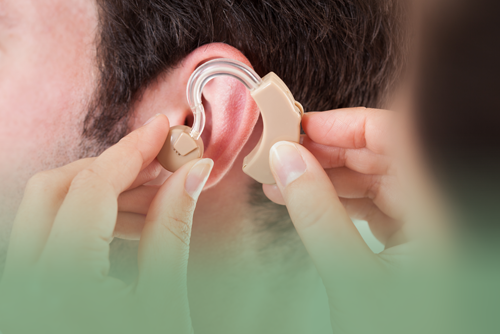Hearing loss is one of those “symptoms” of age we just assume will occur with the passing of time. But, other causes can impact individuals of all ages, from babies to centenarians. The good news is, hearing aid technology has improved in the last few decades—and continues to make advancements—allowing those suffering from impaired hearing to live full, normal lives.
Causes of Hearing Loss
Aside from age-related hearing loss, in which higher pitches naturally become harder to hear, noise-induced loss is a significant culprit. This includes individuals who work in loud environments and have neglected proper ear protection, as well as those who participate in hunting or recreational shooting. Ototoxic hearing loss is caused by certain medications, such as chemotherapy or antibiotics.
Symptoms & Diagnosis of Hearing Loss
The most common indicator of hearing loss is difficulty with speech understanding, particularly amidst background noise. So, for example, in settings like a noisy restaurant or at a ballgame. Phone conversations also start to become muffled. Tinnitus, which is perceived ringing or buzzing in the ears, is often a sign of a hearing problem.
Whether or not one has experienced symptoms, Dr. Rutendo Chikuku of Palouse ENT and Audiology and doctor of Audiology with Pullman Regional Hospital recommends people get a baseline hearing test at an age that’s appropriate to their job or lifestyle. For the average individual, age 50 is typically the time to undergo this testing. But, others may want to create that baseline earlier in life. “For those who are hunters or musicians—particularly musicians, because their livelihood depends on good hearing—it’s good to get a baseline at any time so we’re able to monitor changes,” advises Dr. Chikuku. A hearing evaluation tests various frequencies. Anyone who falls out of the “normal” range may be a candidate for hearing aids. Or, at the very least, a hearing aid trial.
Enlist Hearing Aids Sooner Rather than Later
In a normal hearing ear, the ear captures sound which then travels to the brain for processing. With hearing loss, the brain isn’t getting input from those particular pitches. Because of reactions like brain plasticity, the brain reallocates that “real estate” for another system—typically, the vision center. “If you wait ten years and then decide to get hearing aids, that portion of the brain can no longer be stimulated. It’s not responding well to those tones,” explains Dr. Chikuku.
Link Between Hearing Loss & Dementia
Recent research has proposed individuals with both dementia and hearing loss experience a faster deterioration of cognitive capacity. Dr. Chikuku finds this correlation to be rooted in engagement. “When people can't hear, they're detached. This is for anybody, whether or not they have dementia. You retract because you are unable to hear what other people are saying and your ability to communicate effectively diminishes. Those with dementia are retracted anyway, and hearing loss contributes to that.”
While more research has to be done in order to confirm these findings, Dr. Chikuku strongly encourages loved ones of dementia patients to seek out the help of an audiologist in order to arrest expedited deterioration.
To learn more about hearing loss and advancements in hearing technology, visit Palouse ENT and Audiology.


